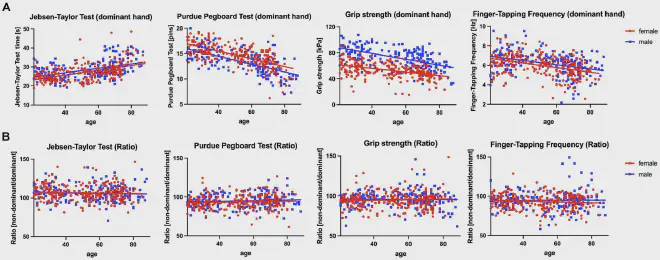Study highlight - Age- and sex-related changes in motor functions
In a study published in Frontiers in Aging Neuroscience, researchers from ABCD-J sites, University of Cologne and Research Centre Jülich showcase the potential of reproducible neuroscience through the use of a DataLad-based database of motor parameters. The data were collected by conducting comprehensive motor assessments among 444 non-left-handed adults without history of neurological, psychiatric, or orthopedic diseases. The assessments included five standardized tests to evaluate basic (grip strength, finger-tapping frequency) and complex (Action Research Arm Test, Jebsen-Taylor Hand Function Test, Purdue Pegboard Test) motor functions.
The study revealed reduced motor function across the lifespan, with significant sex-specific differences. Namely, men demonstrated higher grip strengths and finger-tapping frequencies, while women outperformed men in the Purdue Pegboard Test. Motor performance could predict the age of the participants, and Principal Component Analysis (PCA) unveiled three robust motor components: dexterity, force, and speed.
These results not only provide a comprehensive assessment of age- and sex-dependent motor functions in healthy individuals, but also illustrate the type of insight that becomes possible with reusable, well-structured datasets. By leveraging DataLad to build the database behind these data, this work lays the groundwork for a scalable resource that can support future motor function research. For example, the data and results presented in this study could inform a future study to classify depressive patients using motor parameters.

There's no articles to list here yet.